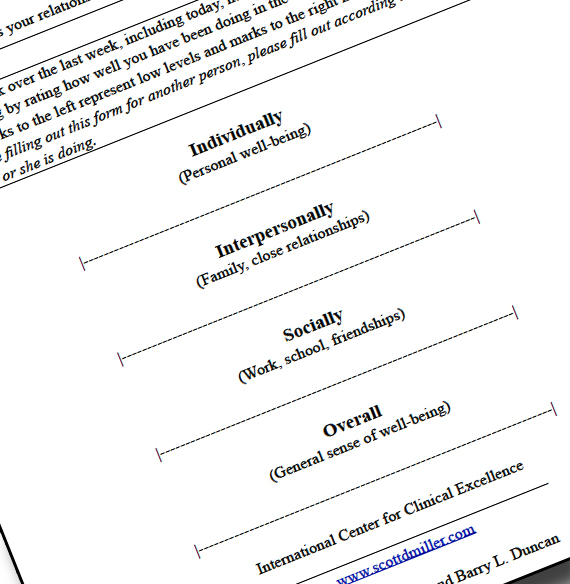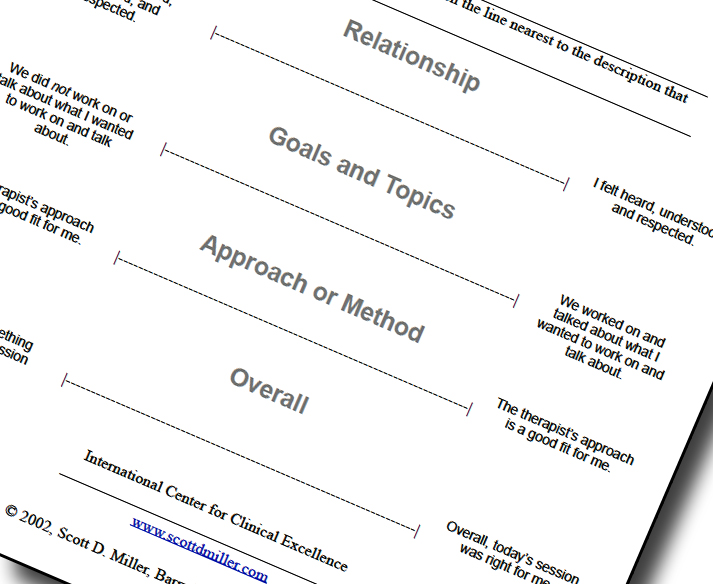Feedback Informed Treatment
Improving Outcomes & Efficiency in Mental Health Services
Feedback Informed Treatment (FIT) practices give our clients a real voice in the therapeutic process. The result is better outcomes, more efficient services and greater cost-effectiveness.
Over the years, competing therapeutic approaches have clamoured for attention as the most effective, or as the so-called "treatment of choice" for a particular problem. Academic and professional journals abound with outcome studies to support these positions.
Based on these claims of supremacy, providers of mental and behavioural health services revamp their programs accordingly. Individual helping professionals, influenced by this exclusive focus on therapeutic approach, devote all of their time and professional development to learning a particular model of practice.
And so it goes on.
Meanwhile, there has been no discernible global improvement in therapeutic outcomes. Mental health services and counselling programs continue to struggle with waiting lists, client drop-outs and, worse, long-term treatment relationships with no improvement.
"Talk" therapy is effective - certainly more effective than medication alone or placebo. Yet, we've spent most of our efforts pointing to the therapeutic approach or model as the major active ingredient when therapy is effective. Unfortunately, a growing and robust body of research tells us that therapeutic approach actually has a very low influence on outcome. Instead, client factors, client preferences and the therapeutic alliance have a resounding impact on whether counselling or therapy will be effective.
More specific, two factors stand above the rest as the strongest predictors of retention, progress and success of treatment:
“The client’s rating of the alliance with the provider of services”
“The client’s rating of early progress in response to the provider, level and type of treatment offered”
Now, this doesn't mean that helping professionals don't require skill and knowledge in utilizing a bonafide therapeutic approach. In fact, having an allegiance to a respectful approach which acknowledges clients' strengths and preferences, continues to be important. However, in recognition of the two factors noted above, the inclusion of FIT practices during every therapeutic encounter will maximize the potential for a positive outcome, improve retention and reduce the presence of long-term cases with poor or null outcomes.
FIT practices are simple to use and easy to implement. It involves the use of the Outcome Rating Scale (ORS) and the Session Rating Scale (SRS). Both are reliable, valid and ultra-brief methods for monitoring the client's rating of progress and the client's rating of the alliance with the provider of services. Both are used at every session. In collaboration with the client, feedback from the measures becomes the basis for clinical decision-making. Changes in approach, type of service and even the provider of the service can be altered, in order to maximize the potential for progress.
The Halifax Brief Therapy Centre is a strong proponent of the use of FIT practices. We view these practices as being very compatible with the assumptions and beliefs that support solution focused practice: That clients have expertise about their own lives and come to us with strengths, skills and knowledge about what's important to them. More significant, we recognize that FIT practices lead to better outcomes and more efficient services.
FIT Resources
The Heart & Soul of Change is arguably one of the most important books published about the field of psychotherapy. In a clear, methodical fashion, it outlines what works (and doesn't work) in achieving successful outcomes in therapy and counselling relationships. More important, it shines a strong light on client preferences and the therapeutic alliance as being the most critical factor in positive outcomes.
Regardless of one's therapeutic approach, The Heart & Soul of Change provides convincing evidence for the ongoing use of feedback informed treatment practices during every client contact in psychotherapy.
Scott Miller is one of the leading voices for moving the conversation about what works in therapy toward a focus on client feedback. His website is a great source of blog updates on his work around the world. It's also where you can download a free personal license for using the Outcome Rating Scale (ORS) and the Session Rating Scale (SRS). Agency licenses can also be acquired here.
A complete set of manuals pertaining to the implementation and use of feedback informed treatment practices are also now available on Dr. Miller's site.
Created by Scott Miller and others, the International Center for Clinical Excellence is an extensive online community for practitioners in the helping professions that use feedback informed treatment practices. Regardless of your field of practice, you'll find others who work in similar environments and share your desire to do effective clinical work.







